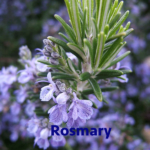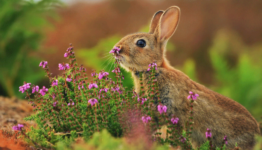The stereotypical rabbit likes nothing more than munching on carrots, and it is true, rabbit do like to eat carrots, and they also love to eat many other plants including clover, peas, blueberries, beans, lettuce and violets. As a matter of fact, when they are hungry enough, they will eat just about any green plant that they can reach. This is bad news for the gardeners who want to enjoy these plants themselves. There are a variety of plants, however, that rabbits tend to avoid, and this article will discuss the best rabbit repellent plants.
 In general, rabbits prefer soft and sweet leaves and fruits, and obviously, low to the ground plants to nibble on. Rabbits will usually avoid fuzzy leaves like those found on a geranium, or flowers that are prickly or hard to reach, especially if other better options are nearby. However, when food is scare, it is not unusual for a rabbit to delicately eat only the blooms of the flowers in a garden, leaving the fuzzy leaves behind. Strong tasting and bitter plants tend to be overlooked by rabbits. Rosemary, sage, basil, lavender and chives are some of the herbs that they are not particularly attracted to. Flowers that will be more likely to be left alone by rabbits include lobelia, snapdragons, petunias, columbines, irises, peonies, purple and coneflowers.
In general, rabbits prefer soft and sweet leaves and fruits, and obviously, low to the ground plants to nibble on. Rabbits will usually avoid fuzzy leaves like those found on a geranium, or flowers that are prickly or hard to reach, especially if other better options are nearby. However, when food is scare, it is not unusual for a rabbit to delicately eat only the blooms of the flowers in a garden, leaving the fuzzy leaves behind. Strong tasting and bitter plants tend to be overlooked by rabbits. Rosemary, sage, basil, lavender and chives are some of the herbs that they are not particularly attracted to. Flowers that will be more likely to be left alone by rabbits include lobelia, snapdragons, petunias, columbines, irises, peonies, purple and coneflowers.
Plants that are vulnerable to rabbit damage can be protected with fencing, and sprayed with deterrents. Young trees can be wrapped at their bases, and rabbit deterring ground covering plants can be planted around other plants to keep rabbits away. Depending on climate, a few ground covering plants to consider include big periwinkle or bougainvillea. Bougainvillea should be used with caution as a ground cover because of its extremely sharp and long thorns, and should not be used where people or pets are likely to step and be injured.
The best rabbit repellent plants are the strong tasting or hard to reach ones, but hungry rabbits are willing to eat almost anything, and so using a strategy of rabbit repellent plants will work best with combined with another strategy.
Gardeners who are resigned to living with rabbits, or even enjoy their company but not the damage they create to their plants, sometimes plant a patch of clover a little ways away from their garden. Given a choice, rabbits will feast on clover or alfalfa, and having some available may be enough to divert them from the less tasty plants that a gardener wishes to preserve.
Another harmless but effective strategy to keep rabbits away is by the installation of a motion-detecting sprinkler. These units may be purchased at reasonable prices in gardening centers or through online retailers, and when set up, they can detect motion and protect about one thousand square feet. These sprinklers will turn on and spray when they detect movement, so they are also effective in deterring deer, cats, and any other nuisance animals, with, perhaps, the exception of birds.











